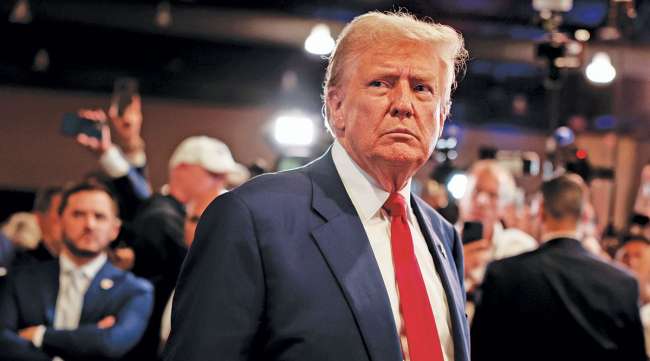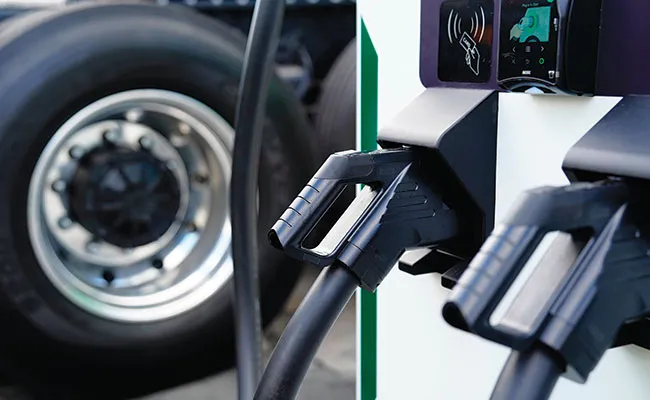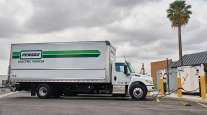Senior Reporter
In 2025, Will Trump Administration Be a Friend of Trucking?

[Stay on top of transportation news: Get TTNews in your inbox.]
In June, American Trucking Associations President Chris Spear traveled to Florida to meet with then-presidential candidate Donald Trump to gain insight into what the trucking industry might expect should Trump win a second White House term.
Spear said he received a welcoming reception from Trump and left feeling encouraged about where a second Trump administration would stand on some of the industry’s critical issues — namely, the regulatory push for electric trucks, efforts to unwind the independent contractor model and lawsuit abuse.
“I think the leading issue we spent most of the time on was environmental,” Spear said of the meeting. “It was about California, the overbearing timelines and targets, and candidly, the bullying that the California Air Resources Board has deployed against our truck and engine manufacturers.”
The CARB electric truck mandate is a hot-button issue for Spear, who is hoping the incoming administration — Trump will be inaugurated on Jan. 20 — will take action in 2025 to help out the industry.
It takes 15 minutes to fill a diesel to go 1,200 miles, six to eight hours to charge an electric to go 200 miles. [The transition to EVs] just can’t be done in five or six years. It’s just impossible.
Chris Spear, ATA president
Image
“We have timelines and targets where we’re retiring existing equipment and forcing motor carriers in California and CARB-adopting states — about a dozen of them — to have to purchase equipment that’s not widely available. And if you could get your hands on it, you wouldn’t be able to afford it,” Spear said. “It’s three times more expensive than what you’re currently paying for a brand-new diesel that’s emitting 98½% less than 40 years ago. You don’t have the electric infrastructure in place — not even for cars and definitely not trucks.”
He continued, “It takes 15 minutes to fill a diesel to go 1,200 miles, six to eight hours to charge an electric to go 200 miles. It just can’t be done in five or six years. It’s just impossible.”
RELATED: Trucking Trade Groups Oppose EPA Phase 3 Rule

Trucking industry leaders feel confident the Trump administration will slow the rollout of electric vehicle mandates. (Bing Guan/Bloomberg News)
Spear is optimistic that some slowing of aggressive adoption timelines is on the way.
“I feel very confident that we’re going to see waivers being revoked and a new direction being taken with respect to environmental stewardship,” Spear said. “I feel really good about what we did in 2024 on that issue. Going forward in 2025 I think we’re in good stead.”
The Truckload Carriers Association is likewise expecting the incoming administration to temper the rollout of some environmental rules.

Heller
“Certainly, the lesser regulatory environment is one that we would expect from this administration,” said David Heller, TCA senior vice president of safety and government affairs. “It goes without saying, the trucking industry has long been a supporter of the environment. However, I think the Trump administration will realize that we do need to be more strategic in these types of rollouts. There’s a lot more questions that need to be answered before we can actually have a deadline for implementation.”
In a statement, TCA said that it, along with more than 150 Republican members of Congress, supported a letter that was drafted by Sen. Mike Crapo (R-Idaho) and U.S. Rep. Randy Feenstra (R-Iowa) urging the Environmental Protection Agency to withdraw EPA’s “Final Rule: Greenhouse Gas Emissions Standards for Heavy-Duty Vehicles — Phase 3.”
“Expectations suggest that the standards may be revised to levels deemed achievable for internal combustion engines, extending compliance timelines, and exploring alternative pathways to reach emissions targets, such as the adoption of renewable diesel,” the letter said.

Horvath
Dan Horvath, ATA’s senior vice president of regulatory affairs and safety policy, said his group also is taking aim at EPA’s greenhouse gas Phase 3 standards for heavy-duty vehicles. He noted that the federation will be pushing the administration to reopen GHG 3 and revise the goals to an “achievable standard.”
On another top industry issue, Spear is encouraged that Trump can do something from a federal standpoint to slow down the pace of nuclear lawsuits in trucking — generally those with jury awards exceeding $10 million — and is likewise pleased with gains that have already been made at the state level.
“It’s a long-term investment,” he said of ATA’s efforts on the issue. “We’ve had multiple states do very well in 2024. [We are] teaming them up in 2025 when their statehouses come into session to be sure they’re enabled to not only advocate common-sense legislation in that arena but be in a position to pass it as well.”
Experts from Sailun Tires dive into strategies for managing tire expenses amid a challenging freight market. Tune in above or by going to RoadSigns.ttnews.com.
Spear added, “We saw some continuance of nuclear verdicts that I think should be alarming. They’re now spilling beyond the company to the actual supplier, including trailers. Wabash is a great example of the lengths the plaintiff’s bar will go to put our industry out of business and put thousands of people out of work.”
Spear was referring to a pair of recent large product liability cases. In one, Wabash National Corp. was ordered to pay $462 million in damages after a fatal crash where a passenger car collided with the back of one of its trailers, killing two people. The company was still reviewing its legal options as of Transport Topics’ press time. In a separate case, an Alabama state jury issued a $160 million verdict against Daimler Truck North America in a product liability case involving a driver who became quadriplegic after a 2022 rollover accident.
TCA in a statement outlining its 2025 predictions noted the incoming administration is expected to support legislation that would allow lawsuits to be brought into the federal court system, a move that could help curb nuclear lawsuits.
Want more news? Listen to today's daily briefing above or go here for more info
Horvath said in 2025 he expects to see a “regulatory slowdown.”
“I think we’ll be headed into a deregulatory period, generally, which will be a relief for the industry,” he said. “We’ll stop talking about speed limiters for sure, but I do think the [Federal Motor Carrier Safety Administration] will finalize Compliance Safety Accountability changes and continue to pursue safety fitness determinations. Also, it will be very interesting how they approach automated trucks. In many ways, the truck has left the garage on this one, but there is still some desire from industry for direction they can rely on.”
Horvath added, “The new administration is going to want to look and see what the FMCSA has proposed and review all of that.”

Garney
Sean Garney, co-director at Scopelitis Transportation Consulting, noted that the industry should already have an idea of how the Trump-Vance administration will approach trucking issues.
“In one sense, we know a bit about what to expect, considering this will be Trump’s second term,” said. “What’s unique is that presidents seldom get a ‘do over’ in which they’re not hamstrung by mistakes they may have made the first time around,” Garney said. “Given this, I feel, in many ways, this administration will hit the ground running at a high level.”
He added, “That said, how quickly administrative agencies can get back up to speed is a bit of a question mark.”






